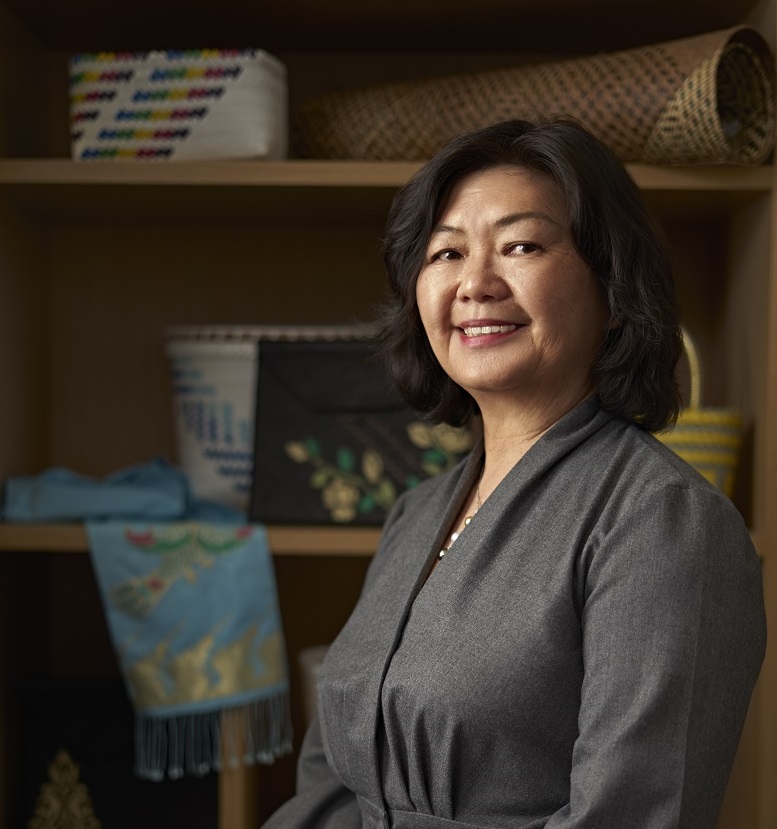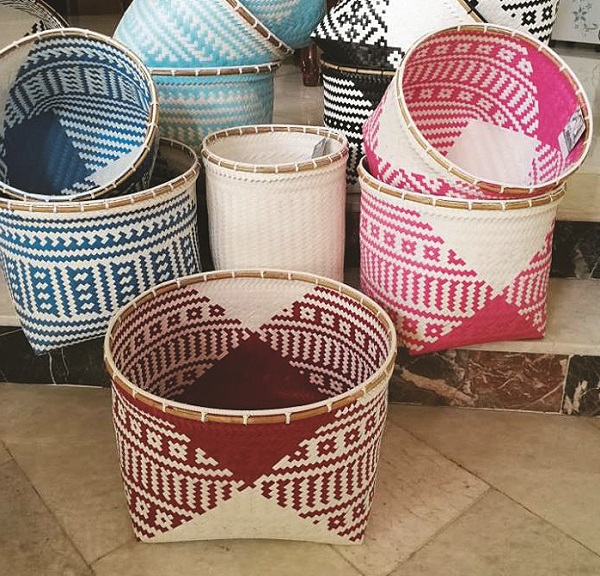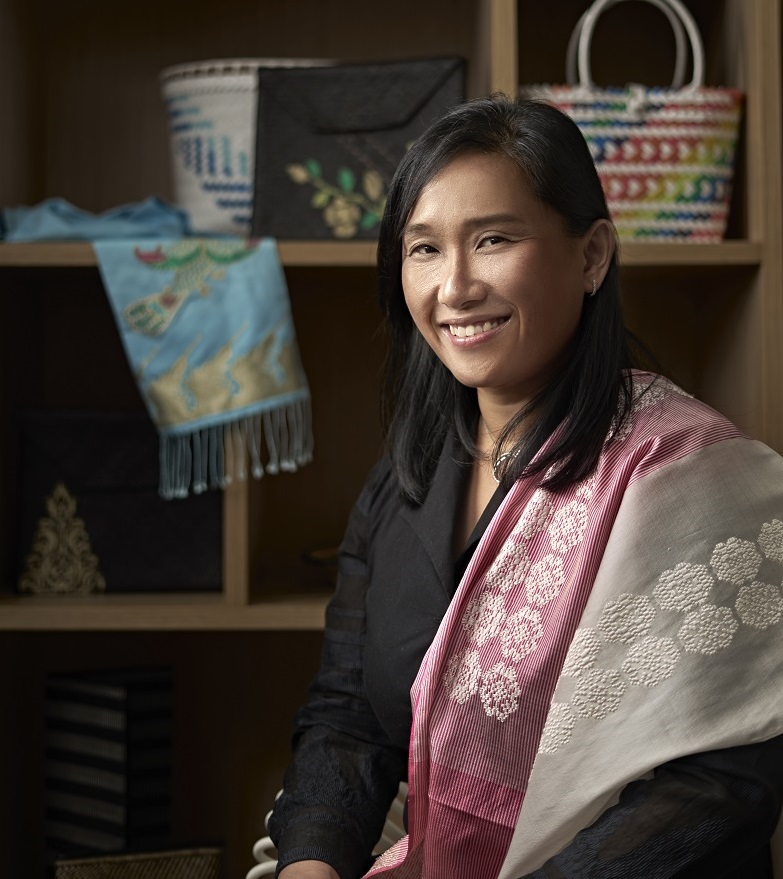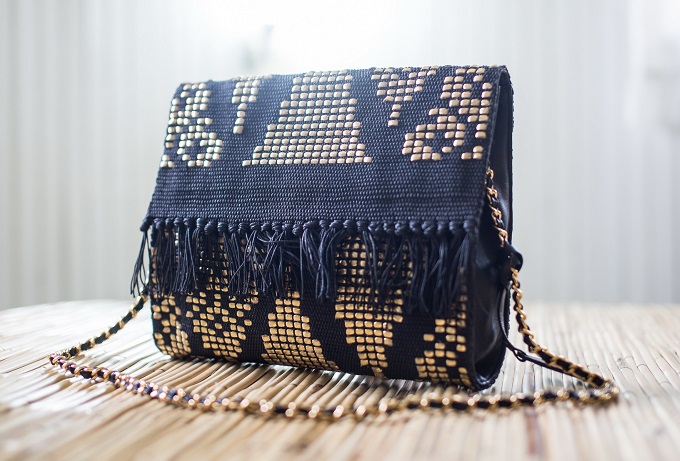
(Photography by Edmund Lee)
As Helping Hands Penan (HHP) chairman Violette Tan and Tanoti director and co-founder Jacqueline Fong arrange their colourful and intricate songket pieces — some of which took up to six months to weave — and multi-coloured, neatly woven bags and baskets for a photo shoot at The Edge office, the atmosphere is warm and lively.
Tan and Fong chat like old friends but their paths had not crossed until they met while working with Sarawak’s Penan community not too long ago. Besides the camaraderie, both women share an unwavering commitment to the causes they champion. Not only do they determinedly search for new ways to improve their products but they also look out for each other. In fact, some of Tanoti’s products are sold by HHP as the latter has a stronger presence in the peninsula, Singapore and Brunei, says Fong.
HHP, which is a non-governmental organisation (NGO), and Tanoti, a social enterprise, have dual aims. One is to preserve the traditional crafts of the Penan people and the other, to provide these craftsmen and women with a means of livelihood. HHP focuses on buying and reselling the craft made by the womenfolk using traditional weaving while Tanoti is a songket boutique.
Though Tan and Fong have other commitments, their job at HPP and Tanoti is as good as full-time. I meet Tan a day after HHP’s sale at a bazaar in Publika and Fong right before she leaves for Singapore where she is due to give a talk on the preservation of traditional art.
How it all began
HHP was formed eight years ago after a chance meeting between a group of expatriate parents, whose children were studying at an international school in Brunei, and some people from the Penan community. “We met after dropping off our children at the boarding house on Monday. The Penan had come to town to seek medical treatment at a halfway house called Rumah Sakai at the back of the Limbang Hospital. The premises were in a sorry state and very filthy … It was challenging … they did not like us initially (but) eventually our intentions became clear to them — that we wanted to help and had no ulterior motive. Over time, they began to trust us,” Tan recalls.
“Those who came to town brought their rattan craft with them. We started buying their products to resell in Brunei and channelled the proceeds back to them.”

As demand for the products grew and Tan and the other volunteers became more involved in the socioeconomic plight of the Penan community, the team began making trips to the villages located deep in the rainforests of Sarawak to buy their handicraft to sell in the cities.
“The Penan are expert weavers who use traditional skills that are passed down from generation to generation. Their products are usually made of rattan, bamboo and mengkuang but due to commercial activities that have infringed on their surroundings where these natural materials once grew in abundance, production has slowed and the craft has become costly as the materials are increasingly hard to come by,” says Tan.
Not only does HHP buy the craft from the weavers, who are paid up front, but it also provides input on how to make the products more marketable. “We encouraged them to make practical bags using their traditional weaving skills. We suggested the sizes, patterns and colour combinations. Today, these bags have become very saleable, thus providing the Penan women with a steady income.”
But the dwindling supply of rattan and the difficulty in obtaining the material compelled HHP to introduce the PVC belt — essentially, brightly coloured strips of sturdy PVC, and now the backbone of the NGO’s core range of baskets and bags — to the weavers in Limbang in 2011. According to Tan, this was the turning point for HHP. “That said, we don’t stop the Penan from making craft from rattan. We are currently buying and reselling rattan items from a few villages in Ulu Baram.”

Born in Johor, Tan was a school teacher in Singapore before she met her husband, whose work took them to Brunei, which they have called home ever since.
With her children having “left the nest”, Tan says she is happy to spend her free time on supporting HHP. She stresses that the voluntary organisation is driven by teamwork — its members are mostly expat wives whose husbands work for Brunei Shell Petroleum.
HHP was officially registered last year and its products are found predominantly in Malaysia and Singapore. The products also have an international reach, thanks to the volunteers taking them home (to Australia, the UK, Oman, Canada and the US) and selling them there.
On why the Penan became their chosen community, Tan says, “Of the 40 ethnic groups in Sarawak, we found the Penan to be in most need of help in all aspects, including basic necessities like food, clean water and shelter. Some have been resettled but it was not by [their own] choice. Statutory efforts to help them adapt to a sedentary life have been slow and sparse, and the people themselves have been resistant to change.”
Tanoti, meanwhile, was founded as part of an R&D workshop set up by Yayasan Tuanku Nur Zahirah before it was privatised in 2012 pursuant to a restructuring undertaken by the foundation.
Of the 40 ethnic groups in Sarawak, we found the Penan to be in most need of help in all aspects, including basic necessities like food, clean water and shelter
On how she and co-founder Dr June Ngo manage the social enterprise together, Fong says, “June and I decided to start this without much thought. Our objective at the time was to ensure the girls (weavers) continued to practise the skills they had learnt from June when she was a consultant with Yayasan Tuanku Nur Zahirah. All we wanted when we set up Tanoti was for songket to survive as a craft.”
Fong, who had held a top corporate job in Kuala Lumpur, has since returned to her hometown of Kuching to concentrate on Tanoti and oversee the management of a number of boutique hotels there.
The way forward
“Tanoti is continuing Yayasan Tuanku Nur Zahirah’s vision — to make songket contemporary in order to arrest its decline. Our core business is still very much the preservation of the heritage craft of songket weaving,” Fong stresses. “What also developed within Tanoti was our community initiative to help develop Penan craft. Today, our Penan artisans have been able to enhance the value of their rattan basketry.”
This, she says, is the raison d’etre of the social enterprise, which has won multiple awards, including the World Craft Council Award of Excellence in Handicraft last year.

Currently, six highly experienced senior women weavers make up the master weavers’ community in Tanoti House, where the intricate songket pieces slowly but surely come to life. “To join our training programme, we basically allow any woman who is interested in learning to weave songket to practise it as a career. The only requirements are that she wants to learn, has the right attitude and is keen to contribute to a group environment,” Fong says.
Quality is the core of Tanoti’s operations and the result of its stringent control is immediately visible in the beautiful masterpieces produced. The weavers spend many hours labouring over the silk threads used to produce the exquisite fabric, which requires keen attention to detail. It is only fair then that the high-quality craft has premium price tags.
One of Tanoti’s strategies to keep demand for the craft alive is to create more contemporary items in modern design using songket. The range of items produced by the fully and proudly Sarawakian brand includes sampin, shawls, fabric, wedding veils, party clutch bags, home furnishings, interior finishing and textile wall art, all made using traditional songket techniques. This is in keeping with Tanoti’s promise to clients to “produce only high-quality pieces, meet deadlines and use traditional (purist) techniques”. Focusing on songket Sarawak, the organisation hopes to help the traditional art form withstand the test of time by encouraging more young people to consider weaving as a career.

In tandem with the aim of preserving songket, Tanoti signed a memorandum of agreement with WWF-Malaysia last year, agreeing to undertake rattan craft development work with the Penan community in the Kubaan-Puak region of Ulu Tutoh. Fong says their objective is to enhance the value of the craft by infusing modern design applications into the traditional art form, providing a means of earning sustainable income.
“We have achieved relative success in this venture thus far with one of Long Lamai’s unique products, Coilings, winning the World Craft Council Award of Excellence in Handicraft last year. Apart from our success in disseminating the Penan artisanal story, we have also managed to supply Penan rattan craft to buyers in Germany, the UK and Australia. We have also secured both interior design and product supply contracts in respect of rattan basketry, allowing the artisans to secure mid- to long-term cash flow,” she explains.
Like any meaningful endeavour, HHP and Tanoti have had their fair share of hurdles. “Many challenges come with the business of handcrafting. In the early stages, developing a viable market in Malaysia and offshore was a major challenge, as was capacity building. Now, the biggest challenge is keeping costs down as inflationary pressures have arisen from various angles to increase our operation and production costs: foreign exchange fluctuations, increased cost of labour and cost of raw materials,” says Fong.
Innovation and quality are aspects that HHP is constantly aware of. “Weaving with PVC is very different from weaving with the softer rattan. Initially, the products looked coarse and untidy and had colour combinations that did not appeal to modern society. We were only able to sell the earlier batches as people were kind enough to support the handmade products for a good cause. However, as nicer and better quality works were produced by the more experienced weavers over the years, demand has taken off. People tend to be more discerning anyway and we are constantly looking for new designs as well.”
For city folk who happily pick up these beautiful baskets and bags at weekend bazaars held in air-conditioned shopping malls, what is not usually highlighted is that each trip to the villages costs over RM1,000 per person and takes hours of gruelling driving in four-wheel drives on rough roads (if any) for the volunteers. But it is clear that the women do not mind as it is but a small price to pay for the ultimate goal of preserving traditional craft while providing the Penan with a source of much-needed income. Tan enthuses that public support has been amazing, resulting in the need for an increasing number of trips to the interiors to commission work and to get the products to where the demand is. But, she adds, flashing a bright smile, that it is “a good problem to have”.
For city folk who happily pick up these beautiful baskets and bags at weekend bazaars held in air-conditioned shopping malls, what is not usually highlighted is that each trip to the villages costs over RM1,000 per person and takes hours of gruelling driving in four-wheel drives on rough roads (if any) for the volunteers.
Community development initiatives
In the years of working with the Penan weavers, HHP and Tanoti have become familiar with the socioeconomic challenges faced by the community, which explains their many development and enrichment initiatives.
Launched six years ago, HHP’s Sponsor a Child education programme came about when volunteers discovered that the main reason for the high school-dropout rate was transport, or the lack of it. “So we hired a truck to ferry the students to and from school and to their homes in the jungle during the term holidays,” says Tan. “The cost of chartered transport is high, which we found hard to meet. So we began to look for donations. That is how we decided that each donor would be assigned a sponsored child.” But the efforts have not been without challenges, as Tan tells us. “The biggest challenge is to impart to the Penan parents the importance of education and sending their children to school. Penan parents are understandably protective of their children’s safety and well-being when they leave their homes in the jungle.”
Sponsorship includes transport costs that range from RM50 to RM80 per month, subject to distance, as well as school essentials like stationery, uniforms, shoes and toiletries, besides other support rendered on a case-by-case basis. The current beneficiaries consist of over 100 schoolgoing children and seven who are pursuing tertiary education at teachers’ training colleges, polytechnics and other institutes of higher learning.
HHP also runs Project Light, which provides solar lights to the weaver communities in Ulu Limbang (Lg Selurong, Lg Sembayang, Lg Adang, Lg Rayah and Lg Napir) and Ulu Baram (Lg Lesuan, Lg Siang, Lg Selurong and Ba Marong). “Although a few of the villages owned generators, they could not afford the high cost of the fuel needed to run them. As the Sarawak Rural Development Board has started installing solar panels in several villages in Ulu Limbang, we will now focus more on Ulu Baram,” Tan points out.
Dedicated to the intellectual element of songket preservation, Tanoti has been invited by Universiti Malaysia Sarawak to help market the products designed or facilitated by Unimas researchers and produced by the Penan community of Long Lamai in Ulu Baram — which has further assisted in product innovation and spread awareness.
On their long-term goals, Tan says, “So far, we have seen a vast improvement in [the weavers’] lives and financial situation. The mission of empowering the Penan women has been partially achieved. In the long run, we hope to encourage the younger generation — who we are currently sponsoring in terms of education — to take over (from us) and manage the marketing of the craft to wider markets.”
She adds that she is especially proud that the women and young girls who did not receive an education are able to use their weaving skills to earn a living.
In many ways, arts and crafts contribute to the soul of a community. In fact, historians have long considered arts and crafts as key characteristics of early civilisations and believe their extinction could mark the gradual loss of some of the communities’ defining features. Sadly, many traditional crafts are beginning to fall by the wayside today. Perhaps, this is the greatest contribution of HHP and Tanoti — preventing or at least slowing down the extinction of indigenous art forms while reinventing them for modern society. This is indeed a cause worth championing.
For information on stockists, visit www.tanoticrafts.com and www.facebook.com/HHPenan
---
This cover story appeared in the Oct 9, 2017 issue of The Edge Malaysia. Save by subscribing to us for your print and/or digital copy.


